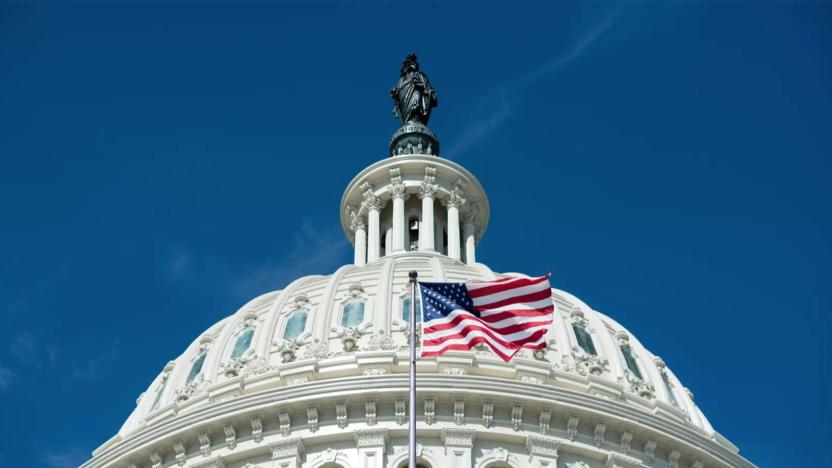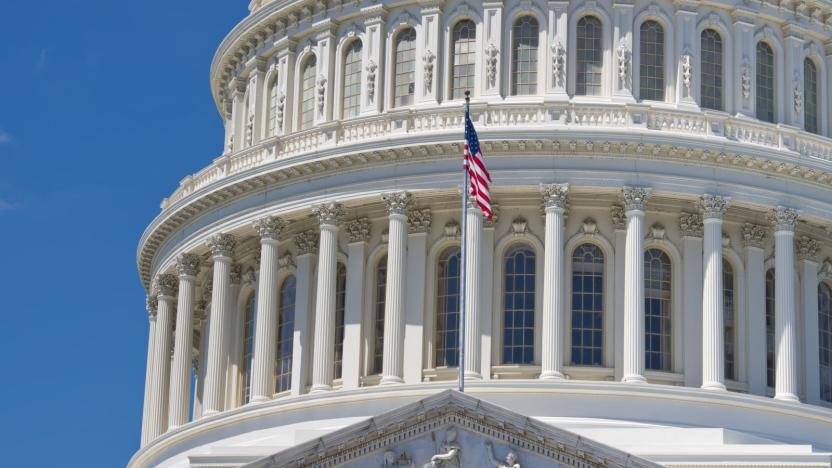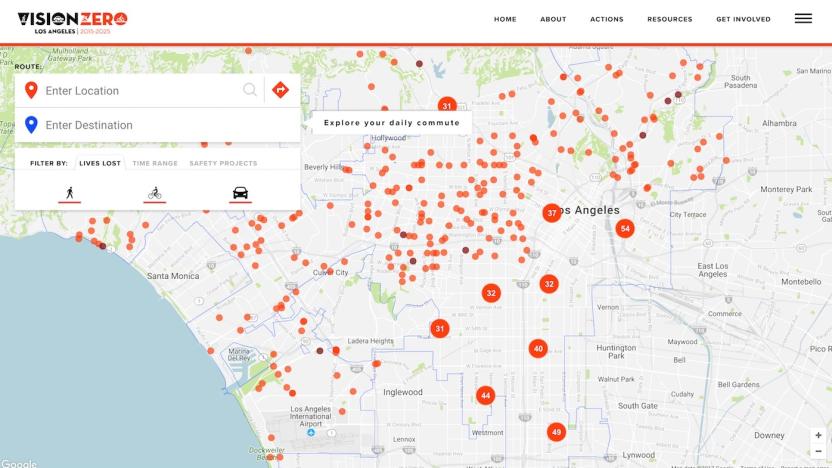opendata
Latest

US signs act that opens government data to the public into law
POTUS has signed a bill into law that includes the OPEN Government Data Act, following approvals (and amendments) from the Senate and then by the House of Representatives. The sweeping legislation is aimed at making public data released by the government easier to access via smartphones and other electronic devices. It essentially requires that federal agencies publish any "non-sensitive" info in a "machine-readable" format (meaning in a file type that a phone or laptop can process, rather than a raw data dump).

Congress approves act that opens US government data to the public
Congress has passed a bill that could make it easier for you to access public data released by the government. The House approved the OPEN Government Data Act on Saturday, while all eyes were on the shutdown, as part of a larger bill to support evidence-based policymaking. It requires that federal agencies must publish any "non-sensitive" info in a "machine-readable" format (essentially in a way that's legible on your smartphone or laptop). The act also insists that agencies appoint a chief data officer to oversee all open data efforts. Having passed the Senate last Wednesday, the bill is next headed to the President's desk.

NASA helps businesses make use of its satellite data
NASA has made its raw satellite data widely available for a long while. Now that it has a privatization-minded leader, though, it's looking to make that data more palatable for the business crowd. The administration has released a Remote Sensing Toolkit that should make it easier to use observational satellite info for commercial purposes, including straightforward business uses as well as conservation and research. The move consolidates info that used to be scattered across "dozens" of websites, and helps you search that unified database for helpful knowledge -- you don't have to go to one place for atmospheric studies and another to learn about forests.

Senate passes bill requiring easy access to public government data
Dreams of making government data easily accessible just came a little closer to reality. The US Senate has passed a defense authorization bill that includes the OPEN Government Data Act, a bipartisan bill aimed at making public data useful. The measure insists that any government agency info published on Data.gov must be made available in a "machine-readable" format (that is, your PC or phone knows what to do with it) and should be easily searched. To put it another way, the government can't just dump raw files and expect you to make sense of them.

LA fights soaring pedestrian deaths with an interactive map
Open data can be an incredibly powerful tool, but it still requires context and people to actually pay attention to the information for it to be valuable. Los Angeles has discovered this the hard way. Its Vision Zero initiative aims to eliminate traffic deaths by 2025, but compared to other cities with similar programs, LA is coming up short in terms of results. After the program's first full year (2016), fatalities rose by some 43 percent according to the Los Angeles Times. There are a number of reasons for this, including more pedestrian and bicycle traffic, distracted driving and driving under the influence. To combat the rising number, the city looked to data as a means of discerning the most fatal roadways.

Trump creates American Technology Council to 'modernize' US government
The White House has issued an executive order creating the American Technology Council. "Americans deserve better digital services from their government," Donald Trump writes. "The Federal Government must transform and modernize its information technology and how it uses and delivers digital services." The Council's aim is to "coordinate the vision strategy, and direction for the federal government's use of information technology (IT) and the delivery of services through information technology," according to the order.

Steve Ballmer builds an open database of government spending
Our leaders may be determined to make their daily dealings less transparent, but they probably didn't reckon on bored Steve Ballmer. The former Microsoft CEO has spent more than $10 million on a new project to open up the US government budget. USA Facts, as profiled in the New York Times, is an open, searchable database that tracks where almost all of your federal, state and local tax dollars are spent.

Trump's quiet war on data begins
Two months into the Trump presidency, there's still a lot of uncertainty surrounding the new administration. One big area of concern is how the executive branch will deal with the vast amounts of data collected by the government. Federal agencies like NASA and EPA conduct countless studies crucial to understanding our impact on climate change. Labor Department surveys are vital to determining the economic health of the country. Will the administration manipulate data that contradicts its political views? Will information become a tool of oppression? Turns out there's a simpler, but potentially just as troublesome possibility: The White House could simply make it disappear.

Open data reveals dodgy NYPD parking ticket practices
Open data policies in government don't just exist for the sake of convenience -- sometimes, they can reveal serious structural problems. I Quant NY's Ben Wellington took advantage of both New York City's open data and Google Maps to determine that the NYPD was issuing thousands of tickets on streets where parking is legal. While you're allowed to park next to a pedestrian ramp as long as there's no crosswalk, the police issued five or more tickets in 1,966 of these spots over the past 2.5 years. That's over $1.7 million per year in fines against people who were obeying the law.

FCC will publish telemarketer phone numbers to help you block them
The Federal Communications Commission has said that protecting consumer privacy is one of its biggest priorities, and its latest actions prove just that. The communications bureau is going to publish the phone numbers of telemarketers on a weekly basis in an effort to help you preemptively block those annoying calls saying you've won a cruise or some other outlandish claim that might require forking over your credit card info. The idea here is that by releasing these regularly and opening up the data, it'll help software developers build automated apps and the like for heading the calls off before they happen, and improve tech that already exists. This is a natural extension of June's ruling regarding carriers blocking spam numbers, and the FCC says it's still working on a way to extend that to landlines. Want a peek at the first sets of digits? The Verge found the first list. [Image credit: Getty Images]

White House helps you find the right college through open data
It's more than a little late to choose which college to attend this fall, but the White House might have the tools you need to make an informed decision next year. It just launched a redesigned College Scorecard website that relies on open data (a big deal in government these days) to help you evaluate schools, whether you're a future student or a researcher. You can not only find out which colleges produce the most successful graduates, but also the typical debt loads, average SAT scores for newcomers and other factors that aren't always easy to track down. You can even drill down to very specific criteria, such as students who received Pell grants.

White House appoints first ever chief data scientist
The White House has a new employee: Chief Data Scientist and Chief Technology Officer for Data Policy, DJ Patil. His high-level job description, according to the White House blog, is that he'll help "shape the practices and policies to help the United States remain a leader in technology and innovation." On a more granular note, newly appointed US chief technology officer Megan Smith says that he'll be working on the Precision Medicine Initiative that uses data to help physicians provide better care while protecting their privacy.

Researchers use cell-phone data, not precogs, to predict crime in London
Just this year we've seen open data give rise to recreations of Denmark in Minecraft, the ability to compare cities at the same scale and also collections of geo-mapped tweets and traffic lights. But what about a practical application for all of that info, one that has a more tangible benefit to society, like, say, crime prediction? That's what the University of Trento in Italy had in mind with its "Once Upon a Crime" study. The researchers coupled freely available (and anonymous, aggregated) demographic and mobile phone data with real crime data to forecast where in London an infraction might occur. Just how accurate was it? The Italian scientists say that their predictive algorithm was on-point, accurately anticipating whether an area would have either high or low levels of vice, 70 percent of the time. No, it's not quite enough to let Chief Anderton and co. start running wild just yet, but it could be a way to help cities struggling with budget woes decide what areas need more (or fewer) police patrols. [Image credit: Getty Images]

'Watch Dogs' web app turns real data into a virtual surveillance state
It seems like there's even more truth to developer Ubisoft's ode-to-hackers, Watch Dogs, than we first thought. Like we've previously reported, the game's depiction of a smart city that connects drawbridges, traffic lights and its population's smartphones (among other things) all to a single operating system is closer to fact than science-fiction, but the game studio has taken the notion one step further. With the We Are Data web app, you can wade through maps of publicly available geo-location information like tweets, Foursquare check-ins and even traffic light and CCTV camera placement -- all stuff you can find in the game's Chicago. As of now, you can only live out your Aiden Pearce fantasies with info from neighborhoods in London, Berlin and Paris, but there's quite a bit to click on should you be so inclined. The available datasets aren't nearly as extensive as, say, something like Urban Observatory's, but it's pretty neat nonetheless. If searching for public restroom-locations from your desk isn't quite your cup of tea, you could always leave the browser tab open in the background -- its ambient city sounds are oddly calming.

White House helps tech startups make advanced parts
It's one thing to come up with a clever product idea, but it's something else to actually build it; it can be tough to find the materials you need, let alone the tools to put everything together. That's where a new round of White House initiatives might just lend a helping hand. As part of its open data efforts, the administration is upgrading its research data site so that startups can easily find government manufacturing and research facilities; the Department of Energy and NASA have outlets dedicated to working on clean energy and aeronautics, for example. The project will eventually surface government-backed patents and other manufacturing info that's frequently tough to track down.

FDA makes it easy for apps to give you public health data
Want to know if it's safe to buy an unknown foodstuff or medicine when you're already at the store? You'll have that option soon. In step with the White House's open data efforts, the FDA has launched OpenFDA, a platform that makes it easy for apps to fetch public health data. Developers only need to implement some search code to pull up information; before this, they had to sift through reports or make special requests. OpenFDA only provides data on adverse drug reactions and medication mistakes right now, but it should expand to recalls and labeling after the current trial phase. You'll have to wait for the first FDA-savvy apps to roll out. Still, it shouldn't be too long before you can walk up to the drugstore counter with confidence. [Image credit: AP Photo/Kevork Djansezian]

The US is opening up the Smithsonian's digitized art collection
The White House promised that it would open up government data last year, and it's now expanding those plans in some intriguing directions. For one, it's opening up the Smithsonian American Art Museum's digitized collection; you'll soon get to build apps and other tools using the institution's artwork as a foundation. Even curators don't have that much access right now, the administration says.

Open data gives rise to a virtual Denmark in Minecraft
Since the US government opened its troves of public data we've seen some pretty neat projects like climate-change prediction tools and deforestation-monitoring systems. Denmark, on the other hand, has taken a different approach: the Danish Geodata Agency used internally developed topographic maps and elevation models to build a 1:1 recreation of the happiest country within Minecraft's blocky confines. Unlike the virtual Great Britain we've seen before, this pixelated Denmark is more than just natural features like hills and forests. As Ars Technica has spotted, it includes accurate replicas of highways, homes, landmarks and businesses too. The project was intended to showcase the country's open-data initiative to its students and educators, but anyone can take a gander until the Danish government's game servers shut down in late October. Server rules, however, have disabled enemies and TNT -- no Creeps allowed, naturally.

NASA is offering code from more than 1,000 programs for public use
Everyone has probably day-dreamed of launching a space-ship from their backyard at some point. Well, now that NASA plans to release over a thousand of its software systems into the public domain, your idle musings could become a reality. On April 10th, the outfit is dropping a ton of free code for things like life support systems, aeronautics and, as Wired reports, even cryogenics, online for your perusal. This is an extension of what it's been doing with its technology transfer program for the last 50 years, and like Data.gov and DARPA's Open Catalog before it, the result of President Obama's push to open government data to the public and digitize it for easy access. The source code will be spread across SourceForge, GitHub and NASA's website for now, but by next year it should be consolidated in one easy-access database. What's more, NASA said that post release it'll keep adding new code to the database. Now is the time to vote for a favorite space suit if you already haven't -- you just might need one after all. [Image credit: Kenneth Lu/Flickr]

Data.gov redesign preview modernizes public data delivery
While we know the government's spying on our personal data, what's it doing with all of the public info it gathers? President Obama's answer to that question was creating Data.gov, a portal that publishes, among other things, public school funding amounts. Four years on, though, and the site looks and navigates like a product of its time. The modern redesign that launched today as a preview is part of this May's Open Data Executive Order that hopes to graft non-proprietary and machine-readable data formats "into the Federal Government's DNA." The homepage combines published research from a range of headings -- education, energy, finance, global development, health, research and safety -- and the tweets of public servants about said data, into one river of news. It's cool to see the government taking charge and making all this easier to access, but we're wondering how much it'll cost us next April.




